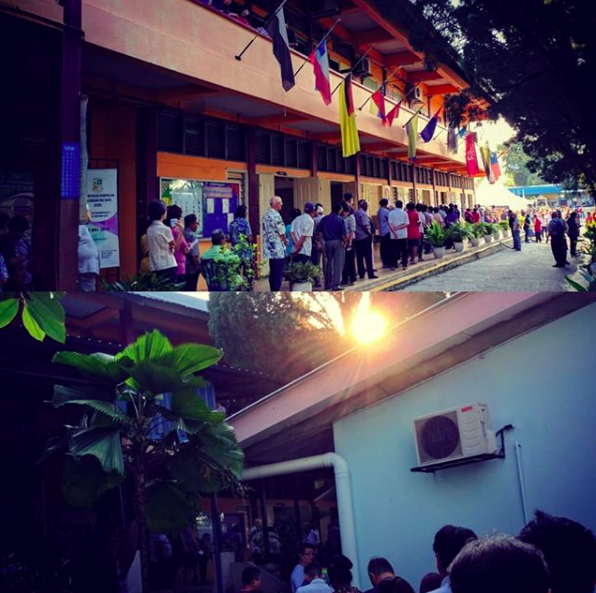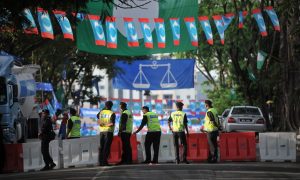There was already a queue of hundreds of Malaysian voters by the time the gates opened at my suburban polling station for the 14th general elections (GE14). While some were enthused to make their mark on Malaysia’s future, others seemed a little resigned yet determined to carry out what one retired civil servant in the queue said was a “citizen’s national service”.
There were numerous reports of long waits in huge queues of over two hours long, often double or more the time it took to cast a vote in the previous GE13. There were also reports of unstamped ballot papers and votes going into the wrong boxes, and men being turned away and asked to change out of their casual shorts before being allowed into the voting booths. And the inconsistent reports of the Election Commission (EC) allowing those caught up in the big queues to be allowed to vote even after the 5pm closing time if the voters were still in queue. Some of these irregularities were addressed by the Election Commission chairman at a lunchtime media conference on election day, baldly assuring Malaysians their votes would still be counted.
Much social media traffic included posts of Malaysians showing off the indelible inked fingers of those who’ve already voted, and the typical Malaysian feasting that occurs soon afterwards. It was as festive a day as the Malay word for elections implied, a festival of choice or pilihanraya.
But the serious discussion on polling day was also about winners and losers, often raising the two factors previous rival private polling and data collections were inconclusive about: that winning GE14 was much about voter turnout, whether it surpasses GE13’s high of nearly 85%, where the higher the turnout the better the chances were for the opposition Pakatan Harapan (PH) coalition. And whether the 37 or so marginal parliamentary seats “too close to call”, according to the final Merdeka Centre polling before GE14, were to be swept up in any purported momentum for change towards PH. For polling day, there was much speculation about an unprecedented hung parliament, and whether it was feasible given the depth of enmity between the rival coalitions and their leaderships, with all sorts of darkly muttered scenarios of extraordinary measures taken to grab power in such uncertainty. There needed to be some sort of emphatic win, either way, senior members of both coalitions had indicated the previous week — Barisan Nasional’s (BN) caretaker prime minister Najib Razak won’t survive his own UMNO party’s upset of not improving GE13’s results for long if not. Nor will Mahathir’s coalition, which has built up a great head of steam, accept a slender loss.
Amidst polling day’s febrile climate of expectations, the night before GE14 was, by comparison, relatively sombre. Both the incumbent Najib Razak and his nonagenarian challenger Dr Mahathir Mohamad made speeches at the same time, on air and online. While the caretaker prime minister again used government-licensed and party-linked terrestrial television station TV3 to make a set of last-minute promises for the weeks ahead, Dr Mahathir relied on a Facebook broadcast that had streaming hiccups and was sketchy in parts, at least at the final opposition coalition rally in Petaling Jaya that I attended. The younger man’s short-term promises aired on traditional but sturdy broadcast architecture contrasted with the older man’s longer-term vision sold over a still flaky social media network.
Najib’s promises were planned for the near future, including exempting those under 26 from paying income tax, and adding extra holidays and toll-free use of the highways for post-Ramadan festivities later this month. The speech came across like another stump speech, another pitch for votes from the so-called millennial generation. The older politician was more future-focused on the horizon ahead, making an emotional appeal despite sounding tired after his hectic bout of national campaigning. Dr Mahathir promised his winning the elections would enable broad and deep institutional reforms, suggesting he wanted to right his previous wrongs as he confronted his mortality. Reviving the heyday of Malaysia’s industrialised economy, retooling it for the new services-oriented information age, and supporting women’s equality with better opportunities that also included the young were keys to restoring the nation’s glory and fame, he explained, as was defeating the spectre of corruption and the “cash is king” culture he alleged was now widespread throughout government.
Over the previous several months of meeting Malaysians across the peninsula, and especially in the past 10 days as the official campaign season nudged even usually disengaged and self-declared “fence-sitters” to pay attention, I found many voters agreeing on a few key themes: that the rising costs of living was a central worry, even in small towns and semi-rural areas like the FELDA kampongs in the interiors that were surrounded by palm oil trees as far as the eye could see, which BN has traditionally seen as a “fixed deposit” of votes for itself.
Partly because of the skilful politicisation of the 1MDB scandal by the opposition PH, and the relatively inept way the BN federal government has also handled other related funds scandals, including the murky dealings over the Muslim pilgrims fund and FELDA privatisation, the unease over “uncontrolled” corruption is palpable. Few Malaysians I met outside the city elites could articulate the corruption scandals’ highlights or their details, but many felt the Najib government did not do enough to address their concerns, which had been stoked by the widespread messaging phenomena of WhatsApp chat groups. For UMNO operatives working to secure key state governments in Johor and Perak, there was a need to prosecute their case for reelection on state issues, to make the issues as local as possible, as UMNO in these states saw their chief ministers as popular bulwarks against an unpopular federal leader, a prime minister tainted by scandal that one Johor party campaigner said was “difficult to defend” over alleged lavish lifestyles that contrasted badly with underemployed locals struggling to pay the bills. Much politics was local, even though national issues often intruded as dangerous undercurrents. The ubiquitous use of smartphones even in rural areas was reflected in the second-generation FELDA settlers I met in Pahang, where a few traded short videos and memes with me over an allegedly irksome state chief minister.
On an airless hot night in a Pahang FELDA village surrounded by palm oil trees a few days before GE14, an older “Pakcik Felda” (as he wanted to identified) shared his gnomic take on the GE14 ceramah taking place across the road, just beyond a row of third-generation settlers who had motorbiked in for the evening. They had just tasted the satay still sizzling nearby. In the muggy stillness, the Main Range hilly spine of the peninsula on the horizon contrasted with the flatness around us, that matched the modest Bahasa accents of the co-op market’s shopkeeper and his assistant. The pakcik said they were born well after he’d arrived in 1965, a few years after this then-jungle was opened up for cash cropping. The pakcik said the third generation of his own family was now mostly working and living elsewhere, a few in nearby Raub town and Mentakab. But all were expected home to vote at GE14 midweek, back in a village that was festooned with mostly BN and PAS flags.
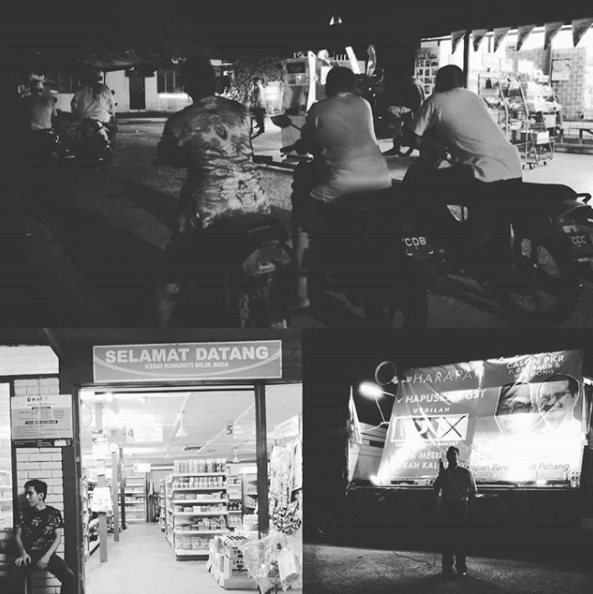
A FELDA kampong in Pahang state.
When asked about how his village saw the GE14 contest, he explained it was much like a tree: “when you plant a tree, you want it to grow straight and upwards, tall and strong. And after awhile, you’re rewarded with the bounty of fruits, sometimes so overripe that the branches bend downwards overly heavy, threatening the tree itself.” So it’d need some trimming and maintenance? Or uprooting and replanting as some plots nearby were doing? Pakcik Felda smiled slightly, winked, and strolled off in the darkness of the still night.
The previous night, at a field made muddy by the light drizzle, thousands had jammed together to cheer and chant the sort of “reformasi” slogans not heard in Putrajaya over 20 years ago, when I’d been in a nearby field watching Dr Mahathir launch this town, with his then deputy prime minister Anwar Ibrahim hovering nearby. Back then, like this night, it was much about notions of filial duty, about the obligations of both fathers and sons, and about the need to win legitimacy among Malaysians newly rich off the 1990s industrialisation boom. Dr Mahathir had launched Putrajaya in the name of the Father of Malaysia, the founding independence prime minister Tunku Abdul Rahman. But now, he was in the battle of his life against the son of his political mentor-father, the second prime minister Tun Abdul Razak, trying to save the national legacy Dr Mahathir alleged the son Najib Razak was irresponsibly damaging.

Nik Omar Nik Aziz, Dr Mahathir, and the Putrajaya crowd light up.
Yet the real star of the night was another son, fresh to the limelight, Nik Omar Nik Aziz, the oldest son of the still revered PAS spiritual leader and long-time Kelantan chief minister, the late Tok Guru Nik Aziz (popularly known as TGNA). Nik Omar in his national debut on the GE14 hustings reminded Malaysians why his father was held in such high regard, across the racialised religious divides that still marked so much of Malaysian politics. At his national debut, in the administrative capital his late father disdained, Nik Omar was at turns generous about Malaysians beyond his Islamist movement, retailing an easy impish wit, while playing cute Kelantanese cadences and accents (or logat Kelate) with a crowd in love with his modesty and credibility as a clean-skin politician. As one son valiantly saved his father’s legacy, facing off today’s truculent PAS leadership, there was another unsparingly taken down by the elder on stage.
Down south a week before GE14 polling day, in a quietly prosperous kampong near Muar, Johor, Abang Said, the warm-up act for local parliamentary candidates Syed Saddiq and former deputy prime minister Muhyiddin Yassin, has the crowd in stitches with his crooning of a multiracialised medley of risque schoolyard tunes, which are punctuated with chants of “tukar!” (change). He sets up the night’s star, the 25-year-old youth leader of Dr Mahathir’s and Muhyiddin’s Parti Pribumi Bersatu Malaysia (PPBM), with a feel-good muhibbah (togetherness) message that takes cues from Martin Luther King’s “I have a dream” speech, that Malaysians when united can do anything under tonight’s bright full moon.
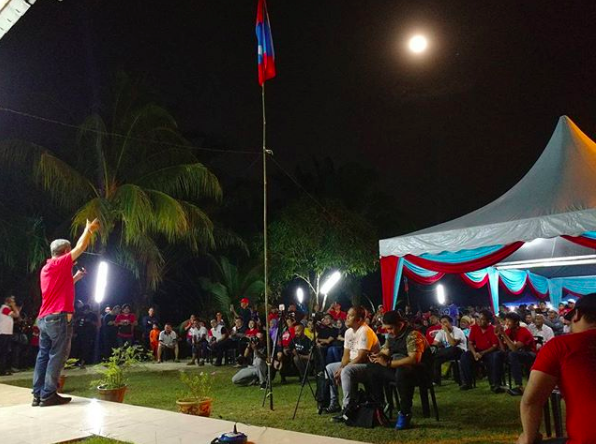
The mostly under-40s Malay audience whisper to each other, sounding awestruck about their own boy-wonder-done-good, his filial stories of honouring the many sacrifices his working-class parents have made resonating for several sitting near me. Many know much about how families only have limited time together because so many are forced to work for better pay across the border in Singapore, doing 16-hour days during the working week commuting to the city-state for often menial jobs. Yet Syed Saddiq’s brand of populism and its doubts about globalisation’s costs and its underemployed bodies is ambivalent about how the allure of Singapore’s better paid workplaces can be addressed across the border in Johor. Syed Saddiq’s diatribe against corruption, the big debts the federal government is carrying, and for “maruah” or honour and honesty in governance wins him enthusiastic applause: “we are the coalition of the future!”
Next door in central Johor’s Sembrong electorate, Hishamuddin Hussein was defending his parliamentary seat. The senior minister, cousin of caretaker prime minister Najib, and son of the third Malaysian prime minister ran a campaign that featured his own style of logos and slogans, with smart shirts that played on his popular nickname “H2O”. In an electorate rich off palm oil and a fraction the size of neighbouring opposition seats, Hishamuddin was expected to win handsomely following the redrawing of electoral boundaries.
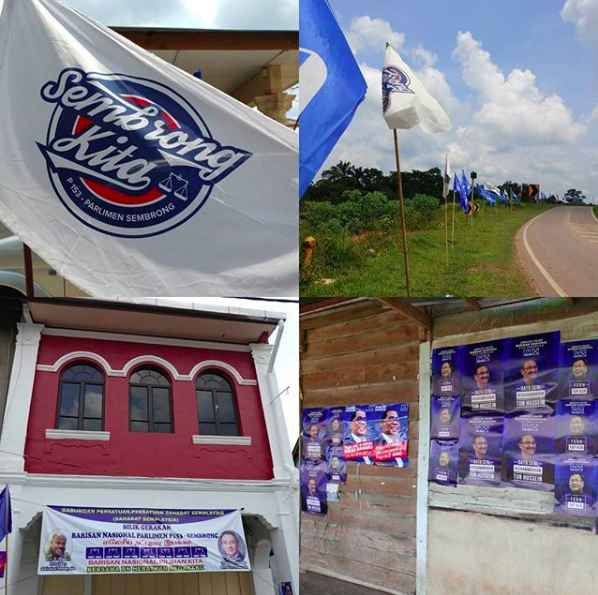
The Sembrong style flutters in the breeze.
But his opponents and a few shopkeepers in this electorate noted that Najib’s billboarded faces were harder to find, and the H2O branding offered a distancing from a federal UMNO-led government that many disdained. While few in Sembrong expected a “Malay tsunami” of votes against UMNO, no one was willing to rule out this allegedly remote possibility if there was a major swing against the incumbents.
For a group of Malaysian Indian youth who had gathered to cheer on a passing parade of H2O campaign vehicles, there was a bracing reminder about a small community displaced in the transition of the area’s economy from rubber to palm oil trees, that had also paid a steep price in the racialised politics that informed this transition. Many families had been displaced with small compensations that barely replaced the homes and schools that were once provided by their estate owners, with these once-anchored communities now reduced to fringe-dwelling in towns nearby, barely making ends meet.
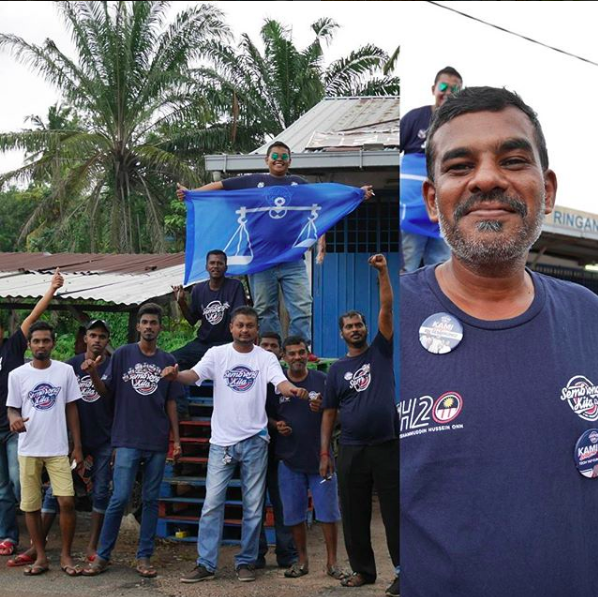
One of the group explained what GE14 meant to them: “It’s the manly thing to do every five years (this election campaigning) and the kids have fun, doing campaign errands, putting up flags as high as possible, getting money for their bikes. Staying busy, avoiding temptations. You don’t understand how little there is to do in small places like this. Hope (or harapan) is for the rich.”
 Facebook
Facebook  Twitter
Twitter  Soundcloud
Soundcloud  Youtube
Youtube  Rss
Rss 